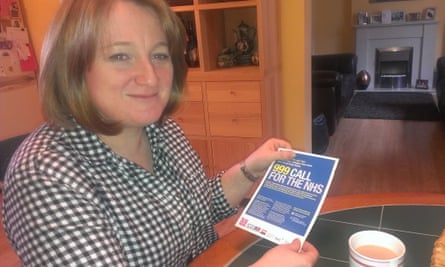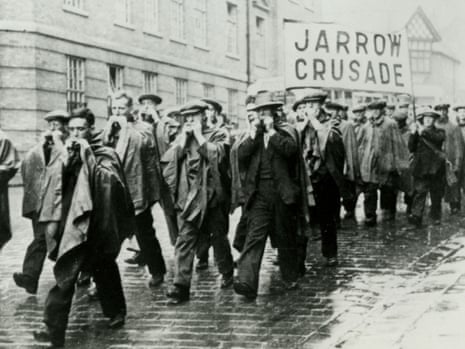A group of County Durham mothers are set to follow in the footsteps of the Jarrow Crusaders and march to London in protest at the "privatisation" of the NHS.
The march, dubbed The 999 Call for the NHS, will set off in August from Jarrow on the banks of the River Tyne and finish at the houses of parliament, planning to arrive just in time for prime minister's questions on 6 September.
The walk will echo the Jarrow March of October 1936, which saw 207 people troop to London to highlight mass unemployment in Britain. It will stop in many major towns and cities across the country to allow people to join the protest, with organiser Joanna Adams saying people can walk as “far or a little as they like, nothing more, nothing less.”
Just a month after announcing the march, Adams says that over 700 people have signed up to take part in some or all of the 300 mile journey, demonstrating how excluded many people feel from politics.
“People are feeling ignored and feeling as if they can’t participate in politics and this is about enabling people to have a voice and to be part of something,” she said.
“This is a real people’s march... I’ve got two kids and work in a call centre – I’m doing this because I’m angry and I know lots of other people are angry too.”

It's not the first time an attempt has been made to recreate the Jarrow crusade in recent years. In 2011, a group of young people marched to parliament to demand action on youth unemployment. It was harder than they expected, with numbers dwindling from at least 300 at the start to just 16 at the 60-mile mark, according to the Independent.
The decision to march this time comes in response to the government’s passing of the so-called 119 Clause of the Care Bill on the 11th March. This small print allows health secretary Jeremy Hunt to downgrade or close a hospital without consultation - even if it is performing to a good standard.
Adams, a 41-year-old mother of two from Darlington, claims the 119 clause contradicts a court ruling which labelled Hunt’s decision to downgrade Lewisham Hospital illegal.
"I don’t know what happened to ‘no decision without me’ but as far as I can see, the people of Lewisham won a court case saying their hospital couldn’t be closed down and in answer to that, this is what the government has done,” she said.
“It’s outrageous; it absolutely makes my blood boil. So we’re going to march all the way to parliament to tell them that we’re not happy with what they’ve done.”
The group are also upset at the report released by the think tank, Reform, which recommends that NHS users should pay a monthly membership of £10.
Personal experience has also motivated Adams. Both of her parents died from cancer, followed by her sister Sarah, aged just 44. In addition, her first child was conceived using IVF at the James Cook University Hospital in Middlesbrough. She feels that it’s imperative that the legacy of free health service is protected for future generation: "As a mother I will not sit back, I will protect what we all have taken for granted; healthcare available irrespective of wealth. I will not let them take it away from my children. Not without a fight.”
All are welcome on the march, but Adams is particularly targetting other mothers. "As carers and mothers who access healthcare more, we feel the government policy has adversely affected us," she said. "The government and department of health keep saying NHS founding principles will not be compromised. Yet when services are being downgraded or closed down there is no choice but to make a stand. They say the principle on cost and ability to pay won't be compromised, yet 49% income can be generated from the private sector in our local hospitals and if a service is closed down you lose the right to access to free health care."
She insists the march is not an attack on the coalition government and warns the Labour party it will face the same pressure from the group to save the NHS: “This is about saying to any government: ‘This is our NHS. We made it, we paid for it, we own it, and we love and we will fight for it."

Comments (…)
Sign in or create your Guardian account to join the discussion